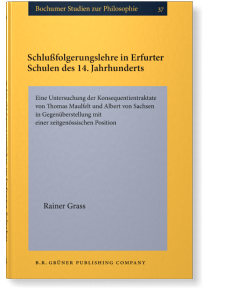Schlußfolgerungslehre in Erfurter Schulen des 14. Jahrhunderts
Eine Untersuchung der Konsequentientraktate von Thomas Maulfelt und Albert von Sachsen in Gegenüberstellung mit einer zeitgenössischen Position
Author
As the title indicates the author presents a contemporary theory of consequence. In so doing he establishes a terminology that enables a description, interpretation and evaluation of medieval theory independently of medieval vocabulary.
In the interest of better understanding the medieval writers the author puts himself in the position of the medieval scholar in Erfurt. The reader learns about the Erfurt schools and the controversal debate on the so-called modi significandi, using only texts that are known to have been available in Erfurt in the first half of the 14th century.
The two tracts, a short epitome of Thomas Maulfelt and a comprehensive volume of Albert of Saxony represent the two most common tracts of this discipline, and are discussed on the basis of questions arising in the introduction. New conclusions can be reached about the scope and the goal of medieval consequence theory which is an original accomplishment of the high Middle Ages and its place in the history of logic.
Der Ankündigung im Titel gehorchend stellt der Autor eine zeitgenössische Theorie zu Schlußfolgerung dar. Somit wird eine Terminologie erstellt, in der — unabhängig von der Fachsprache des Mittelalters – die verschiedenen Ausführungen zur Schlußfolgerungslehre des Spätmittelalters beschreiben, interpretiert und bewertet werden können.
Um die mittelalterlichen Autoren Thomas Maulfelt und Albert von Sachsen zu verstehen, versetzt sich der Autor in die Perspektive eines Scholars im Erfurt der Mitte des 14. Jahrhunderts. Der Leser wird über die Schulsituation in Erfurt unterrichtet, er erfährt von der hitzigen Debatte um die modi significandi und blickt zur weiteren Erläuterung lediglich in solche Schriften, deren Vorkommen für die Mitte des 14. Jahrhunderts in Erfurt belegbar sind.
Anhand von Fragestellungen, die sich aus dem Einleitungsteil ableiten, werden die zwei Traktate, die in Form, Inhalt und Umfang die zwei häufigsten Schrifttypen zur Schlußfolgerungslehre repräsentieren, untersucht. So ergeben sich zur Anwendungreichweite, zur Zielsetzung dieser Disziplin, die eine originäre Leistung des hohen Mittelalters ist, sowie zu ihrem Stellenwert in der Logikgeschichte neue Erkenntnisse.
In the interest of better understanding the medieval writers the author puts himself in the position of the medieval scholar in Erfurt. The reader learns about the Erfurt schools and the controversal debate on the so-called modi significandi, using only texts that are known to have been available in Erfurt in the first half of the 14th century.
The two tracts, a short epitome of Thomas Maulfelt and a comprehensive volume of Albert of Saxony represent the two most common tracts of this discipline, and are discussed on the basis of questions arising in the introduction. New conclusions can be reached about the scope and the goal of medieval consequence theory which is an original accomplishment of the high Middle Ages and its place in the history of logic.
Der Ankündigung im Titel gehorchend stellt der Autor eine zeitgenössische Theorie zu Schlußfolgerung dar. Somit wird eine Terminologie erstellt, in der — unabhängig von der Fachsprache des Mittelalters – die verschiedenen Ausführungen zur Schlußfolgerungslehre des Spätmittelalters beschreiben, interpretiert und bewertet werden können.
Um die mittelalterlichen Autoren Thomas Maulfelt und Albert von Sachsen zu verstehen, versetzt sich der Autor in die Perspektive eines Scholars im Erfurt der Mitte des 14. Jahrhunderts. Der Leser wird über die Schulsituation in Erfurt unterrichtet, er erfährt von der hitzigen Debatte um die modi significandi und blickt zur weiteren Erläuterung lediglich in solche Schriften, deren Vorkommen für die Mitte des 14. Jahrhunderts in Erfurt belegbar sind.
Anhand von Fragestellungen, die sich aus dem Einleitungsteil ableiten, werden die zwei Traktate, die in Form, Inhalt und Umfang die zwei häufigsten Schrifttypen zur Schlußfolgerungslehre repräsentieren, untersucht. So ergeben sich zur Anwendungreichweite, zur Zielsetzung dieser Disziplin, die eine originäre Leistung des hohen Mittelalters ist, sowie zu ihrem Stellenwert in der Logikgeschichte neue Erkenntnisse.
[Bochumer Studien zur Philosophie, 37] 2003. x, 264 pp.
Publishing status: Available | Original publisher:B.R. Grüner Publishing Company | Language: German
© John Benjamins Publishing Company
Table of Contents
-
Vorbemerkung | p. ix
-
Einleitung | p. 1
-
Was ist eine Schußfolgerung? | p. 5
-
KonsequentienLehre in der Logikgeschichtsschreibung | p. 40
-
Studium Generale Erfordense in der ersten Hälfte des 14. Jahrhunderts | p. 46
-
Erfurt — der philosophische Diskurs | p. 49
-
Ad Personam | p. 56
-
Die Texte | p. 60
-
Zum Aufbau der Traktate | p. 65
-
Über den Zweck dieser Traktate | p. 74
-
Zur Definition des Untersuchungsgegenstandes Albert | p. 80
-
Maulfelt | p. 129
-
Zur Einteilung von Schlußfolgerungen Albert | p. 153
-
Maulfelt | p. 178
-
Ergänzungen zu Alberts bisherigen Ausführungen | p. 188
-
Ergänzungen zu Maulfelts bisherigen Ausführungen | p. 204
-
Zur Theoretisierung von Schlußfolgerung | p. 210
-
Schlußbetrachtung | p. 228
-
Siglenverzeichnis | p. 234
-
Logiksymbole | p. 235
-
Verzeichnis der Sekundärliteratur | p. 236
-
Verzeichnis der Quellen | p. 251
-
Namensverzeichnis | p. 254
-
Sachverzeichnis | p. 259
Cited by
Cited by 3 other publications
This list is based on CrossRef data as of 15 april 2024. Please note that it may not be complete. Sources presented here have been supplied by the respective publishers. Any errors therein should be reported to them.
Subjects
Main BIC Subject
HP: Philosophy
Main BISAC Subject
PHI000000: PHILOSOPHY / General
